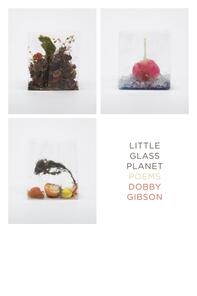Glass. The word itself evokes fragility, as well as a certain sense of clarity. It’s easy to conjure the image of stained glass windows in a cathedral, or worn sea glass on the edge of a sprawling beach: both images clear, both images concrete. But what is really “clear” this day in age? Dobby Gibson’s fourth collection of poetry, entitled Little Glass Planet, asks this very question. The collection starts off swinging, summoning passages that bring readers back to the 2016 U.S. presidential election. The second and third poems, “Praying for November” and “Elegy for Abe Vigoda,” work hand-in-hand to provide a reminiscent look over the past few years under the Trump administration, going as far as to state: “The most horrible person / has been elected president.”
This is a drastic way to make a very clear point known in a very unclear world. In “Elegy for Abe Vigoda,” Gibson goes on to detail a normal day which presumably fell on the same day Trump was elected president, or the day after. He outlines how the world seemed to shatter for him, while everything else seemed to remain the same in his town. This was the case for many Americans, who had to learn to live in a world which did not change physically, but had undergone a massive internal shift. This poem perfectly captures the muddled feeling of unease which follows a major life change, and this change for Gibson happened to be political. The “glass” referenced in the title evokes a certain sense of fragility, which also harkens back to our current political climate. In politics, it is said that the only thing that keeps America’s democracy from falling apart completely is the peaceful transfer of power, and that transfer was rocky when Trump was elected president. America has gone through murky periods like this in the past—for example, with the election of George W. Bush—where it seemed uncertain if one side would ever cede to the other, and for it to happen with a figure such as Trump, it can create a massive polarization among people, worsening the voter divide. Nothing is clear, and nothing has been clear for the past few years, which makes the choice of “glass” all the more complex. At many points it seems that the “planet” is America, a country which is going through an indisputable period of change. In “Fall In,” he writes a “love letter to the world.” He says, “Time is working against us / but it makes us love it more.” Here he is speaking to America as the member of a larger corrupt world which can still produce a lot of good. “Neoplatonism” is referenced in this piece, and one of the main principles of that philosophy lies within the idea of “the One,” which is essentially the source of everything. The fact that this is referenced specifically makes fragile America seem like a part of one amalgamated whole. This idea is ever-deepened by “Ode to the Future,” where Gibson goes from saying “Fuck this government” to “Fuck honey mustard / Fuck the new advanced whitening formula,” implying that America’s political plight isn’t the only awful thing that exists, and for some people the election of a self-absorbed orange egomaniac is about as catastrophic as some bad Crest strips. America is that fragile thing, situated in a fragile world. It is the glass planet, but it is also a part of the glass planet, and our everyday realities within these spheres can just as easily be shattered. Dobby Gibson’s ode to everyday life and the ways in which the modern world has shaped it is an inspired work of literature, filled to the brim with firm opinions, sweeping language, and moments of nostalgia that leave the reader longing to know how our little glass planet got here, and just how close it is to cracking.
0 Comments
Leave a Reply. |
Archives
July 2024
Categories
All
|
|
Glassworks is a publication of Rowan University's Master of Arts in Writing 260 Victoria Street • Glassboro, New Jersey 08028 [email protected] |
All Content on this Site (c) 2024 Glassworks
|


 RSS Feed
RSS Feed
